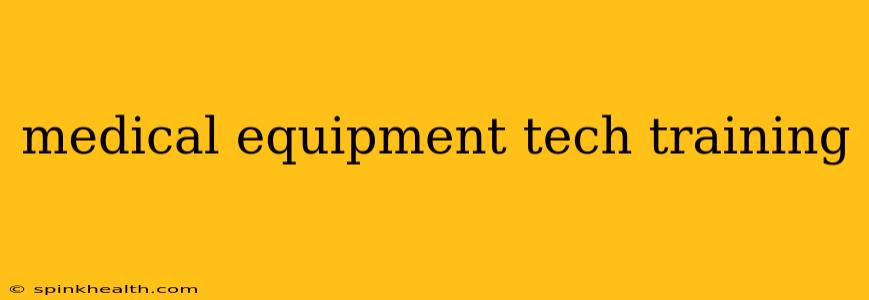Charting a Course: Your Journey into Medical Equipment Technology Training
The hum of sophisticated machinery, the quiet precision of a skilled technician, the knowledge that your work directly impacts patient care – this is the world of medical equipment technology. It's a field demanding expertise, precision, and a deep commitment to excellence. But where do you begin your journey to becoming a skilled medical equipment technician? This comprehensive guide navigates the training landscape, answering your key questions and illuminating the path to a rewarding career.
What are the different types of medical equipment technician training available?
The path to becoming a medical equipment technician (MET) branches out in several directions, each catering to specific interests and career goals. You can find programs ranging from short-term certifications focusing on specific equipment types to associate's and bachelor's degrees offering a more comprehensive understanding of biomedical engineering principles. Some training paths emphasize hands-on repair, while others delve deeper into preventative maintenance and regulatory compliance. Consider your learning style and career aspirations when choosing a path. For instance, an associate's degree might be perfect for someone seeking a broader understanding, while a certification may suffice for someone focusing on a niche area like EKG machines.
How long does it take to become a certified medical equipment technician?
The duration of your training depends largely on the program's intensity and scope. Short-term certifications might be completed in a few weeks or months, while associate's degrees typically take two years. Bachelor's degrees in biomedical engineering or related fields require four years of study. Remember that even after completing formal training, ongoing professional development is vital to stay abreast of technological advancements and regulatory changes within this rapidly evolving field.
What kind of certifications are available for medical equipment technicians?
Several organizations offer certifications for medical equipment technicians, validating your skills and knowledge. These certifications often require passing exams that demonstrate competence in areas like troubleshooting, repair, preventative maintenance, and safety regulations. Some prominent certifying bodies include the American Society for Healthcare Engineering (ASHE) and the International Association for Healthcare Central Service Materiel Management (IAHCSMM). Researching and selecting the right certification based on your specialization is crucial for career advancement.
What are the job prospects for medical equipment technicians?
The outlook for medical equipment technicians is generally positive. The aging population, coupled with advancements in medical technology, fuels the demand for skilled professionals who can maintain and repair sophisticated equipment. Hospitals, clinics, medical device manufacturers, and even government agencies employ METs. Specialization in a high-demand area, such as imaging equipment or cardiovascular devices, can enhance your job prospects even further.
What is the average salary for a medical equipment technician?
Salary expectations for medical equipment technicians vary based on location, experience, education level, and specialization. Entry-level positions may offer a starting salary in a certain range, while experienced technicians with advanced certifications and specialized skills can command significantly higher compensation. Geographic location also plays a significant role; metropolitan areas often offer higher salaries than smaller towns. Researching salary data specific to your location and area of specialization is essential for realistic expectations.
Where can I find medical equipment technician training programs?
Many avenues offer medical equipment technician training. Community colleges, vocational schools, technical institutes, and universities often have programs. Online programs are also gaining popularity, offering flexibility to individuals balancing work and other responsibilities. Research accredited programs in your region or online to find a program that aligns with your learning preferences and career goals. Look for programs that emphasize hands-on experience and provide opportunities for internships or apprenticeships, providing invaluable practical skills.
The Final Chapter: Embarking on Your Career
Your journey into the rewarding world of medical equipment technology begins with careful planning and diligent research. By understanding the different training pathways, certification options, and job prospects, you can make informed decisions and confidently chart your course toward a successful and fulfilling career. The impact you'll have on patient care is immeasurable—making this not just a job, but a meaningful contribution to improving lives.

